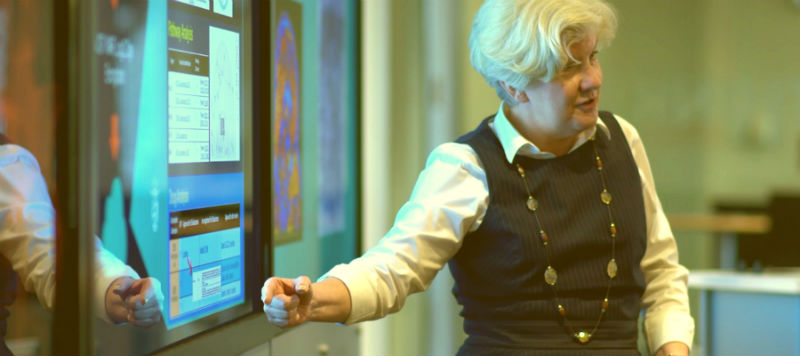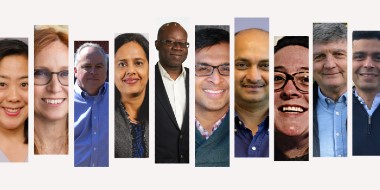AI
Cancer as an Information Science Challenge, and Manageable Condition
June 28, 2018 | Written by: Christine Kretz
Categorized: AI | IBM Research
Share this post:
As a former trauma coordinator for Children’s Hospital of Pittsburgh, I know what it’s like to be on the front lines of patient care. It was perhaps most personal when my cousin was diagnosed with bone cancer. As a patient in the hospital in which I worked, I watched as doctors tried everything they knew to battle the aggressive mutations. The cancer metastasized from his leg to his lungs and the prognosis looked poor.
Luckily for us, the doctors tapped into a broader network of expertise, collaborating with other leading oncologists, and devised an aggressive treatment plan that eventually saved his life. Had we not been located where we were — a major hospital in a first world country — the outcome could have been much different.
Today I serve as Global Strategy Lead for the Healthcare & Life Sciences group within IBM Research, where I’ve seen incredible advancements over the last decade as research in genomics has allowed us to access more biological information from the individual patient, and their specific tumor. The first step is to translate that biological information into useable data. Then, using our healthcare analytics and cognitive computing expertise, we can build systems and apply the techniques to unlock the insights within.
When you couple the previously inaccessible biological data with information from the healthcare and oncology community — such as years of personal electronic health records, clinical studies and published research — we’re faced with a massive amount of data.
The translation of this abundance of data into insights is where artificial intelligence (AI) plays. When we apply decades of knowledge about building machines that can read, see, reason and learn we’re able to begin painting a more comprehensive picture of the disease. In this way, cancer is an information science challenge.

Christine Kretz, Global Strategy Leader, Healthcare & Life Sciences, IBM Research.
AI systems can be used to ingest massive amounts of multi-modal data, then statistically analyze it for insights. This frees doctors to focus on what human experts do well: applying years of experience, judgment and wisdom to making decisions.
In a recent collaboration with New York Genome Center and other specialists, we leveraged data from patients whole genome to provide analysis of patients with glioblastoma, a deadly form of brain cancer with a median survival rate of roughly one year. We demonstrated the value of looking at a patient’s entire genome and developing personalized treatments versus more general approaches. The AI system also generated reports as accurate as a human expert in a fraction of the time – 10 minutes as compared to 160 expert human hours.
Today, a diagnosis of cancer is many people’s biggest fears. But someday, maybe it won’t be. Like others in the healthcare and research community, we believe that someday, cancer may be a “chronic condition” — managed through a personalized treatment plan, under the supervision of experts and available to treat patients anywhere in the world.
To that end, our aim is to develop advanced methodologies from a multitude of research areas and apply them to the observational healthcare data, collected from the healthcare ecosystem, in order to derive insights and then apply it at a personal level in order to achieve the best outcome for the individual.
My cousin was one of the lucky ones. He’s now an orthopedic surgeon, often caring for pediatric cancer patients, relating to his patients on an entirely new level. While medicine isn’t able to cure cancer entirely, we hope that by using data to better understand the disease from multiple levels — genomic, biological, environmental — our research may help enable better outcomes for doctors and patients alike.

Global Strategy Leader, Healthcare & Life Sciences, IBM Research
Meet the Newest IBM Fellows
Since the first class of IBM Fellows in 1962, IBM has honored its top scientists, engineers and programmers, who are chosen for this distinction by the CEO. Among the best and brightest of IBM’s global workforce are 12 new IBM Fellows who join 293 of their peers who have been so recognized over the last […]
Accessibility: The Intersection of Innovation and Inclusion
On this seventh Global Accessibility Awareness Day, let’s talk, think and learn about digital accessibility, inclusion and people with disabilities. As a researcher, I enjoy technology, especially when it comes to helping people with disabilities. Over the years, our team has invented and developed many new technologies that enable accessibility. I would like to share […]
GDPR & Protecting Data Privacy with Cryptographic Pseudonyms
Within two years, most of today’s cybersecurity technologies will be obsolete. Since the beginning of 2016, hackers have stolen more than 8 billion records – more than double the two previous years combined – and that doesn’t account for unreported intrusions. The current system of patches, firewalls and blacklists isn’t working. It’s no match for […]


